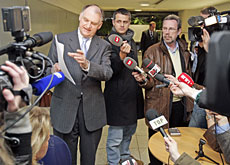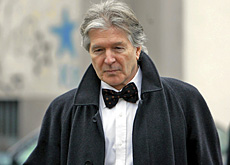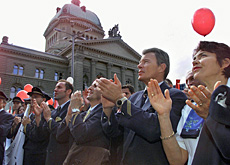Swissair trial leaves questions open

The trial of 19 former Swissair managers and advisors, accused of bringing down the airline with criminal malpractice, has drawn to an inconclusive close.
Observers are unconvinced that judges will meet all the prosecutor’s demands for prison sentences and fines, including a six-month term for Mario Corti. The former chief executive’s reputation was enhanced by a fighting display.
The 19 defendants in Switzerland’s largest corporate trial all denied charges that included damaging creditors, mismanagement, making false business statements and forging documents.
Instead they blamed the Belgian government, the big Swiss banks and the September 11 terrorist attacks for the downfall of the national airline.
The three-judge panel presiding over the case said it would start discussing the evidence behind closed doors. Their verdict is not expected before the end of May.
Journalist Constantin Seibt covered the case, lasting nearly two months at a court in Bülach near Zurich, for the Tages-Anzeiger newspaper. He told swissinfo that the prosecuting lawyers presented an unconvincing case for the major charges.
“I think the prosecution was very weak and they did not do much research. They did not have the courage to tell the big story, they just brought up a lot of small details and were not very convincing,” he said.
“I don’t think they will win with their main points. They presented some minor irregularities but they did not find anything with meat on the bone.”
Zurich-based corporate lawyer Eugen Curti also believes that the prosecution failed to prove enough criminal intent.
“I would not be astonished if all the defendants get away without any penalty. A lot of money has been spent on a comedy or a tragedy – or both,” he told swissinfo.
Emotional response
The grounding of Switzerland’s national airline on October 2, 2001, generated emotional turmoil in the country and left a bitter taste in the mouth of many shareholders and staff who lost money and jobs.
The trial, held five years after Swissair’s demise, was designed to hold executives, board members and outside consultants to account for their actions.
Most refused to answer questions in court, but Mario Corti, chief executive and chairman of parent company SAirGroup from March 2001 until the grounding, used the proceedings as a springboard to mount a passionate defence.
Constantin Seibt recalls an impromptu conference held by Corti outside the court on Tuesday that boosted his public image.
“It was an extraordinary speech about justice, honour and his pride in Swissair. At the end the whole hall broke out into applause, Corti was crying and even the most hard-boiled journalists were fighting back the tears,” Seibt said.
“The public loves Corti because he is a fighter, he is emotional and a good communicator.”
Silence in court
By contrast, the other defendants cut a less impressive figure as they steadfastly remained silent in court, Seibt added.
“Some of the most powerful, dynamic and prominent figures in Switzerland in the 1990s were reduced to silence even though the prosecution was weak. That in itself was a punishment for the biggest scandal in Swiss economic history,” he said.
Matthias Mölloney, Swissair’s head of personnel at the time of the crisis, thinks that sentencing defendants to prison will send out the wrong message.
“This would lead to massive problems because struggling Swiss companies will find it very difficult in future to find anyone to come in and turn them around. There would be no volunteers if they think they may go to jail,” he told swissinfo.
Mölleney, who has not been charged and is not part of the trial, added that some people would be unhappy whatever the verdict handed down.
“The expectation in the public and media is so high that it would not be understood if the judges decide nothing should happen,” he said. “[But] I strongly believe that none of the accused had criminal intentions.”
“It is human behaviour to want to find out who is guilty if something goes wrong. But perhaps a better approach would be to try to learn the lessons from Swissair.”
swissinfo, Matthew Allen
There were 19 defendants, including 16 former members of the Swissair board and the company’s top management, plus three outside consultants who advised the airline.
The investigation took five years and produced 280 metres worth of documents. The prosecution’s indictment ran to 100 pages.
The Zurich cantonal prosecutor spent 40,000 working hours on the case, questioning 300 people and searching 20 houses.
According to the chief prosecutor, the costs of the investigation could total SFr4-5 million ($3-4 million), not including prosecution staff salaries.
Swissair planes were grounded in October 2001, after the company had been in business for 71 years.
The downturn in the aviation market after the terrorist attacks of September 11, 2001, proved the last straw for the heavily indebted Swissair, which folded the following year.
The airline collapsed because it over-extended itself by buying stakes in numerous loss-making airlines, including Belgium’s Sabena and Poland’s Lot, in an attempt to form its own airline alliance.
The remains of Swissair and the regional carrier Crossair were brought together in 2002 to form the new national carrier Swiss, which was in turn taken over by Germany’s Lufthansa in 2005.
The prosecution in the Swissair trial has called for a six-month prison sentence for Mario Corti. The maximum possible sentence is seven-and-a-half years. A financial penalty of SFr1.08 million, which also would go unpaid after three years of good behaviour, and a SFr10,000 fine was also requested.
For all of the other defendants, prosecutors requested suspended sentences of up to 18 months, penalties of up to SFr720,000 and fines of up to SFr20,000.
For Philippe Bruggisser, CEO until early 2001 and author of the expansionist “Hunter strategy”, prosecutors proposed a sentence of 15 months in addition to a penalty of SFr400,000 and a SFr10,000 fine.

In compliance with the JTI standards
More: SWI swissinfo.ch certified by the Journalism Trust Initiative




You can find an overview of ongoing debates with our journalists here. Please join us!
If you want to start a conversation about a topic raised in this article or want to report factual errors, email us at english@swissinfo.ch.